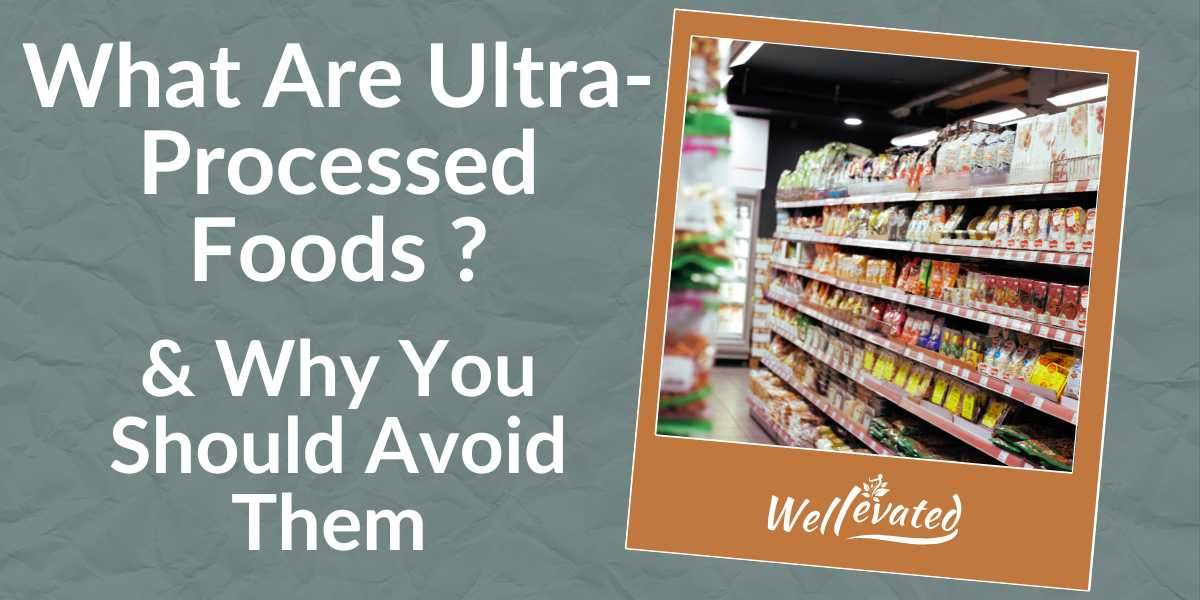We live busy lives. Many of us juggle demanding professional schedules, personal responsibilities and self-care all at once.
When time is limited, it’s tempting to reach for quick and convenient meal options. But not all convenience foods are created equal. Enter ultra-processed foods – a term that’s gained significant traction in the world of health and wellness.
If you’ve heard the phrase but aren’t quite sure what it means - or more importantly, why it matters - this post will guide you through everything you need to know.
You’ll learn what ultra-processed foods are, how they differ from minimally processed options, and why they can have a significant impact on your health. By the end, you’ll feel empowered to make informed decisions that align with your wellness goals.
What Exactly Are Ultra-Processed Foods?
Ultra-processed foods (UPFs) are a category of food products that go far beyond basic processing. They are typically mass-produced and packed with additives, preservatives, artificial flavours and other industrial ingredients not normally found in home kitchens.
These foods often undergo multiple steps, like refining, extruding, moulding, and chemical processing, which change the food’s original structure and flavour profile. Think of items like packaged biscuits, sweetened breakfast cereals, instant noodles, flavoured crisps, fizzy drinks and frozen ready meals.
But here’s where it gets tricky - the word "processed" itself can be confusing. Aren’t frozen veggies also processed? Yes, they are, but not all processing is problematic. To understand the distinction, let's break food categories down into three main groups.
- Unprocessed or Minimally Processed Foods
These are foods in their natural state or those that have undergone minimal changes. Examples include fresh fruit, raw nuts, whole grains, or mild preparation processes like freezing or pasteurisation.
- Processed Foods
Processed foods have had ingredients added or gone through small processing steps to preserve or enhance their flavour but they still closely resemble the original food. Think canned beans, plain yoghurt, or wholegrain bread made with minimal additives.
- Ultra-Processed Foods
Unlike the categories above, ultra-processed foods are often designed to prioritise convenience, flavour and affordability over nutrition.
They are loaded with synthetic compounds and have limited nutritional value, while often being high in sugar, unhealthy fats and salt.
Understanding this distinction is crucial for making better choices about what we choose to fuel our bodies with.
Why Ultra-Processed Foods Matter
For many of us, ultra-processed foods play a sizeable role in our daily diets (whether we realise it or not). But research increasingly shows they’re linked to a range of health risks, both physically and mentally.
- Nutritional Deficiencies
Ultra-processed foods are generally low in essential vitamins, minerals and fibre. Consuming a diet heavy in UPFs may leave you feeling full but chronically undernourished.
- Linked to Health Conditions
Studies have associated a high intake of ultra-processed foods with obesity, heart disease, diabetes and even certain cancers. Much of this is due to excessive sugar, unhealthy fats, salt and additives present in these foods.
- Impact on Gut Health
Your gut microbiome thrives on whole, fibre-rich foods. Ultra-processed alternatives, on the other hand, offer little to no fibre while delivering preservatives and artificial chemicals that may negatively impact your gut health.
- Mental Health Concerns
Emerging research has identified potential links between UPFs and mental health conditions like depression and anxiety. Added sugars and empty calories can cause blood sugar spikes and crashes, which may affect mood and energy levels.
- Overeating and Addictive Qualities
It’s no accident that ultra-processed foods are hard to resist. They’re engineered to be hyper-palatable, a term that means they’re made to taste so good they encourage overeating. That’s great for the food industry’s profits but not so helpful for your long-term health.
How to Minimise Ultra-Processed Foods in Your Life
Feeling disheartened right now? Don’t, awareness is the first step toward a healthier you.
Here are six simple, actionable steps to reduce your dependence on ultra-processed foods and focus on whole, nourishing options instead.
- Read Labels Carefully
One of the simplest ways to make healthier choices is to get familiar with ingredient lists. The longer the list, especially with words you can’t pronounce or recognise, the more likely it’s ultra-processed.
- Cook at Home More Often
You don’t need to be a master chef to enjoy home-cooked meals. Focus on simple recipes using fresh, minimally processed ingredients. Cooking at home puts the power back in your hands, allowing you to control what goes into your food.
- Choose Whole Foods Over Packaged Options
Make fresh fruit, vegetables, whole grains, lean proteins and nuts the bulk of your meals and snacks. Shop the perimeter of your grocery store, where fresh produce and less-processed ingredients are typically featured.
- Plan Ahead
Busy schedules often lead to convenience food reliance. Carve out time to meal prep or batch-cook healthy dishes you can grab throughout the week. Making healthy eating convenient means you won’t need to rely on last-minute ultra-processed choices.
- Replace, Don’t Eliminate
Instead of trying to cut out ultra-processed foods cold turkey, start by replacing a few staples at a time with healthier options.
For example, swap flavoured crisps for air-popped popcorn or instant noodles for whole wheat pasta with homemade sauce.
- Focus on Progress, Not Perfection
No one expects you to go completely processed-free overnight. The goal is to create small, manageable changes that lead to lasting habits without feeling deprived.
Ultra-Processed Foods and Long-Term Wellness
Choosing to consume fewer ultra-processed foods is not just about what’s on your plate - it’s a step toward a healthier, more energised and vibrant version of yourself.
Cultivating awareness of what you eat helps you regain control, properly nourish your body and enjoy a more sustainable, balanced approach to wellness.
The best part? You don’t have to go on this health journey alone. Building a healthier relationship with food can feel overwhelming, but there’s plenty of support available to help guide you in the right direction.
For more tips bonus stuff subscribe to my email list here - https://www.wellevated.co.uk/subscribe








